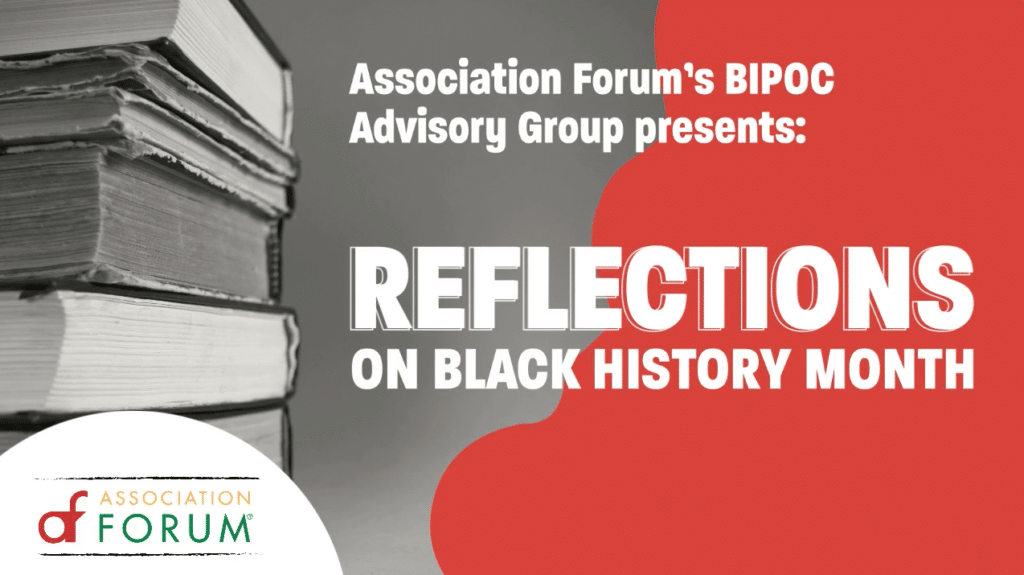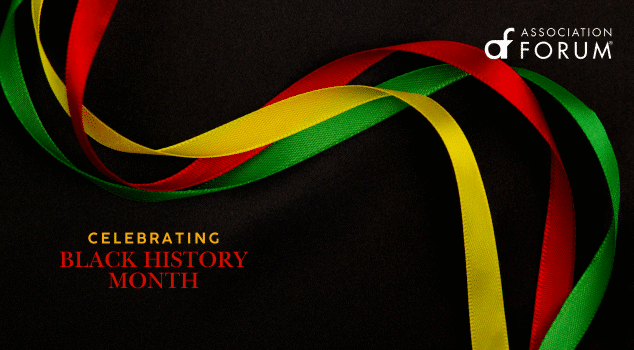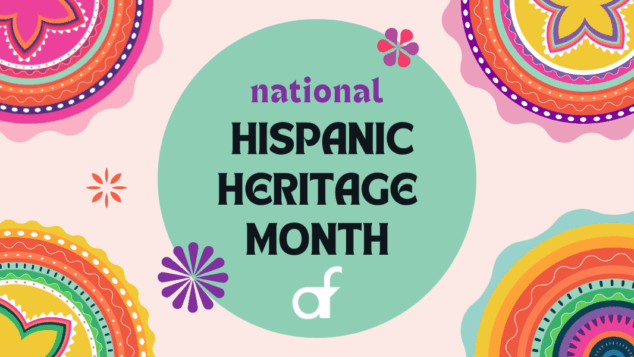Reflections on Black History Month: Jonathan Adams

This video is the second in a series for Black History Month. Organized by Association Forum’s BIPOC Advisory Group, this series asks black association leaders to reflect on this month and their role in making history within our industry. In this video, Artesha Moore, President & CEO of Association Forum, sits down with Jonathan Adams, the first black (and first ever) director of IT for the Water Quality Association. If you prefer to read the transcript, scroll down for the full text.
Video Transcript
Artesha Moore: Hello, I’m Artesha Moore, and I am the President and CEO of Association Forum. And today, I have with me Jonathan Adams, and so I’m going to ask Jonathan to introduce himself.
Jonathan Adams: Hi, my name is Jonathan Adams, and I am the Director of Information Technology for Water Quality Association.
Artesha Moore: Jonathan, thank you so much for being here with us today. We are at a very pivotal time within our history, and so I’d like to hear for you. What does Black History Month mean to you?
Jonathan Adams: Well, for me, Black History Month is all about stopping to … Just hitting pause and reflecting on everything that goes into Black history. It’s a mix of emotions and perspectives, so you have everything from Madam C.J. Walker, to Emmett Till, everything from the Tuskegee Airmen to the Tuskegee experiments. So, Black History Month is all about this mix of pride and pain and inspiration and sorrow, all together, all at once. So, I think the important thing for me for Black History Month is to just focus on the positive stuff, looking at someone like Madam C.J. Walker and understanding, if she can do what she did when she did it, there’s no limit to what we can do today. And then, for the bad things, how far away can we get from those things? How much progress can we make to get ourselves in a better place, away from the … Because, from there to here, that’s been amazing, but we still have a long way to go. And, how quickly can we get there?
Artesha Moore: I think that’s really important, what you said. We’ve come a long way, and we have a long way to go. And so now I’m going to focus a little bit on your role as the IT Director. And, as a person who spent a lot of time in technology in my career, and being the first and only, first female, only person of color, in some of those spaces, I can understand that. So, I want to reflect for you, what is it like to be the first person of color as the Director of IT for the Water Quality Association?
Jonathan Adams: Well, I will say that I’m also the most likely … I’m also the first IT Director for Water Quality Association. So, previously the organization was outsourcing IT. So, I’m the first IT Director in my position. And being the first Black IT Director, I think, for me, there’s two parts of it. There’s the member part. And I don’t have daily member interaction, but when I do interact with our members, a lot of them may not interact with a lot of people of color in their day to day. So, to me, it’s very important to set that standard and set their expectations, or maybe blow away their expectations of what they can expect from a person of color. How we are alike, how we are different, but really just setting that example and that standard.
And then, as we talk about internally, I think it’s very important to have people of color in leadership positions, because for people who are coming into the organization, seeing a person of color, you feel automatically that, “Okay, this is somewhere that I can succeed.” And I think for a lot of us, when we first got into the forum, seeing Michelle Mason and now yourself in that CEO Executive Director spot, you automatically feel like, “Okay, this is a place where I can feel welcome or a place where that I can succeed.”
Artesha Moore: I’m glad you mentioned what you see, and how that inspires you. I was also from afar in DC, very inspired by Michelle Mason in what she was doing in Chicago. And I thought, in some aspect, being able to come in and take the reins too, it was because Michelle made me believe. So, I think about the heroes that I know that are close to home and the heroes that from afar, and that we look up to, and how they fuel us to do things and show up in the way that we do. So, I’m always interested to hear from people, “Who do you look up to, and who do you admire as your heroes?”
Jonathan Adams: I will definitely say my heroes are my mom and dad. And, I’ll get a little bit of personal here, but a lot of people may not know this about me, but I am adopted. So, for my mom and dad, they’re not my biological parents, but they are 100% my mom and dad. But, it’s a thing where I know that my life would be entirely different if it were not for their love and patience and guidance. And so, I just got so much from both of them. From my dad, when I was growing up, he worked two full-time jobs, and he would come home and he only had a limited amount of time to eat and shower and sleep, and do it all again. But, he was always very deliberate about out asking me about my day and making sure that he was asking about school and stuff I had done.
So, that is something that I try to carry on myself. I have three children at home, two newborn twins. So, at times where my patience is stressed, I try to think back to, “Okay, I’m only working one job, so I can do this.” So, that was the lesson for my dad. And then for my mom, one thing that she … There was a lot of different lessons, but the one that I keep going back to is she would say this … She probably said this a hundred times throughout my childhood, but, “When you know better, you do better.” And she would use it a lot to explain people who maybe weren’t doing the right thing, or may have been … Someone cursing out the manager in the store, or someone behaving like an idiot. It’s like, “When you know better, you do better.”
And, it’s something that I don’t know at the time if she even realized how much wisdom was in that, but just as I’ve grown up as an adult, just understanding, when you know better, you can do better. And so, not just in terms of formal education, but that’s obviously a part of it. But, just learning from the experiences and knowledge and the wealth of community that you can get from other people. So, in this past year, I’ve had the pleasure to connect with a lot of different people within the association community, a lot of very bright, talented people. And everyone’s been very welcoming and sharing of their experiences. And so, that is something that still resonates with me is, when you know better, you do better. Because that’s how we get ahead, is just having access to the information that we don’t have.
Artesha Moore: I love that, and I’m thankful for your parents, because those lessons that you just spread for all of us. I will say your mom’s lesson about know better and do better is something that was instilled in me too, from my grandmother. So, I appreciate that and hearing that. And just another plug, I’ve worked at an adoption agency early in my career, the power of that, and the power of connecting families is so important, so thanks for speaking that too.
Jonathan, this has been great, and I really appreciate your openness and sharing with us about what this period of history and reflection means to you, and shining a light on the unsung heroes in your life, your parents. So, thank you so much.
Jonathan Adams: Right. Thank you for having me.
Tags
Related Articles
BAE Chicagoland Kicks Off: Join the Movement!
Black Association Executives (BAE) is officially in Chicagoland, bringing a bold new community to Black...
25/7/365 Leadership: How to gain an extra hour every day (Without burning out)
Association professionals don’t work in a 9‑to‑5 world, but in a 24/7/365 reality. With high...
Celebrating Hispanic Heritage Month with Association Latinos
How to celebrate Hispanic Heritage Month within the association community and Chicago!






